'No particular emotions when killing enemy. It's just a job.' Interview with Ukrainian snipers
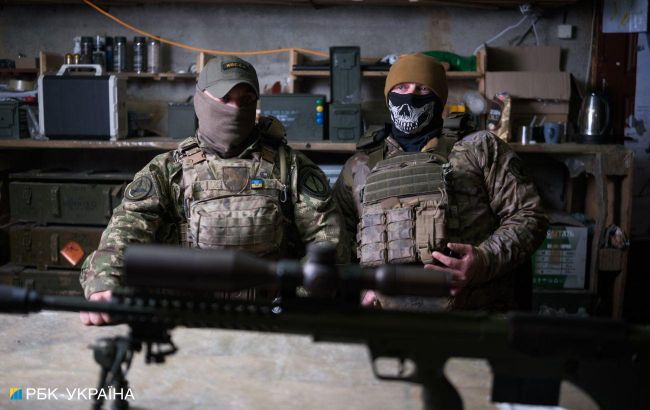 Snipers "Udav" and "Fizruk" at their permanent deployment point (All photos: Vitalii Nosach/RBC-Ukraine)
Snipers "Udav" and "Fizruk" at their permanent deployment point (All photos: Vitalii Nosach/RBC-Ukraine)
Snipers are often called elite fighters, capable of inflicting significant losses on the enemy. Their precision can sometimes even alter the course of combat in a specific direction. What tasks do snipers from a "specialized" unit undertake, how can one join a reconnaissance company, and what qualities are essential for this profession? Read more details below.
Their work is often romanticized in films and books. Still, the snipers themselves believe their role is just another military profession, like that of a machine gunner, assault soldier, or artillery operator. For them, war holds no romance — only grit and grime.
Snipers are one of the most important targets for the Russian forces. Until the enemy exposes their positions, a couple of Ukrainian snipers alone can kill dozens of Russians trying to storm the positions of our defenders every day.
Who definitely won’t be recruited as snipers, whether a helicopter can be shot down w
Motivated volunteers: Reconnaissance company rarely joined by mobilized troops
The unit where our interviewees serve is often described as unique due to the nature of its missions. Its members consider themselves and their comrades to be versatile fighters.
"Udav" ("Boa") is the commander of a special operations sniper group within the reconnaissance company. His comrade and fellow serviceman, call sign "Fizruk" ("PE teacher"), is a first-category sniper. Both are professional military men with more than ten years of combat experience.
For roughly as long, they have been defending Ukraine against occupiers — first in the ATO/JFO operations, and now in the full-scale war. They have fought in battles in towns now widely known across the country, such as Popasna, Mariupol, Zolote, and many others.
This unit is multifaceted, comprising people from various professional backgrounds.
"We are versatile fighters of a reconnaissance unit with the prefix 'special operations.' If there are infantry tasks, we handle them. If there’s an assault mission, we storm. If sniper assignments come up, we take care of those. Some members adjust fire, others are 'flyers' (drone specialists – ed.). There are many professions, and the people are diverse. Everyone has their own specialty," explains "Udav" as we head to their deployment point.
For now, they are temporarily in the rear, but they can be called to a mission at any moment. While there are no tasks at hand, they improve their shooting skills and attend various field training sessions. Recently, they organized an event to honor their fallen comrades.
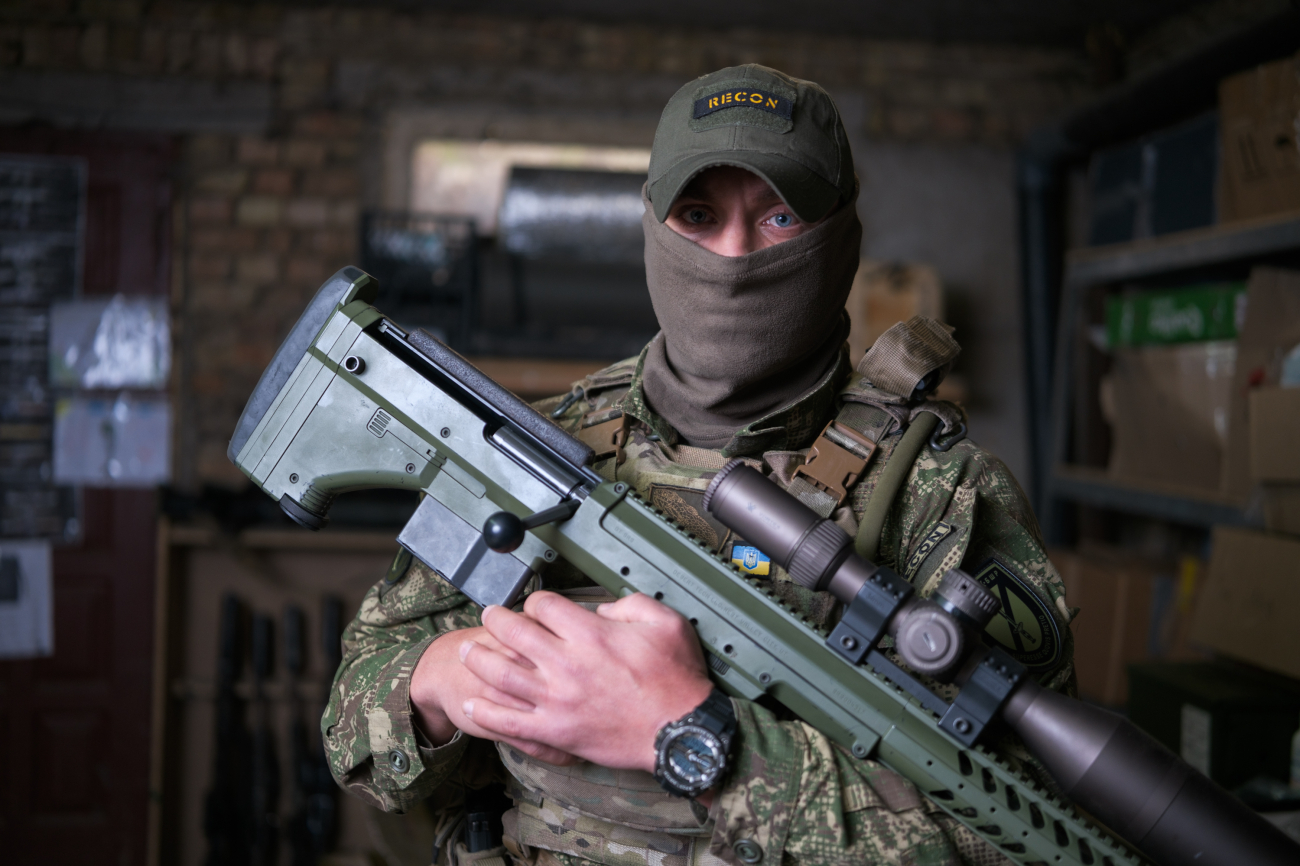
Photo: The commander of the reconnaissance company's special operations sniper group, call sign "Udav," has been serving in the military since 2008.
To join this unit and become a sniper, a soldier first undergoes basic infantry training. They must also train as a reconnaissance soldier. Only then can they choose their specialization. Some in the unit see themselves as machine gunners, others as aerial reconnaissance specialists. Medics are also needed. Of course, they must also take specialized courses.
"Everyone in our unit has combat experience; it's rare for someone to come from civilian life. Even rarer are those who are mobilized. More often, people transfer from other units. There are civilians, but most are motivated volunteers. Because, let's say, this unit is unique. The work is such that if you don't have the desire, no instructor can force you to do it," explains the military officer.
Important targets for the Russian forces. Why snipers don’t show their faces
For photos, snipers wear fleece buffs that cover most of their faces except for the eyes. They explain that "there are certain moments," and it’s better to be safe. However, it’s partly a myth that snipers are literally hunted when they are in civilian clothes.
"In my 14 years of service, I’ve never been searched for. Whoever needs to find me will recognize me anyway. I’ve served with ‘Fizruk’ for many years, and I can recognize him whether he's wearing a buff or not. I’d recognize him even if he turned his back to me. If they want to find me specifically, or any of my comrades, it won’t be a problem. But for the general public, it’s still better to cover the face," says "Udav."
In civilian life, snipers rarely talk about what they do.
"I really wouldn’t want many people to know what I do. It raises a lot of questions. And in general, I don’t want anything unnecessary around my work. Where I serve, what I do. It’s one of the general safety measures," adds "Fizruk."
However, Ukrainian snipers are among the highest-priority targets for the Russian forces. They "silently take out" all enemy targets that come into their sights. Snipers disrupt logistics and can quickly spread panic among the enemy. If a sniper is taken out, any unit will have more freedom of action.
"If the enemy sees 3-5 infantrymen and there are a couple of snipers nearby, they’ll pay special attention to them. We always pay attention to such things as well. For example, there’s a certain situation on the front, for two days everything’s as usual, and then suddenly something atypical starts happening. Different sounds of gunfire. New weaponry. Anything new that draws attention – it could be a sniper," explains "Udav."
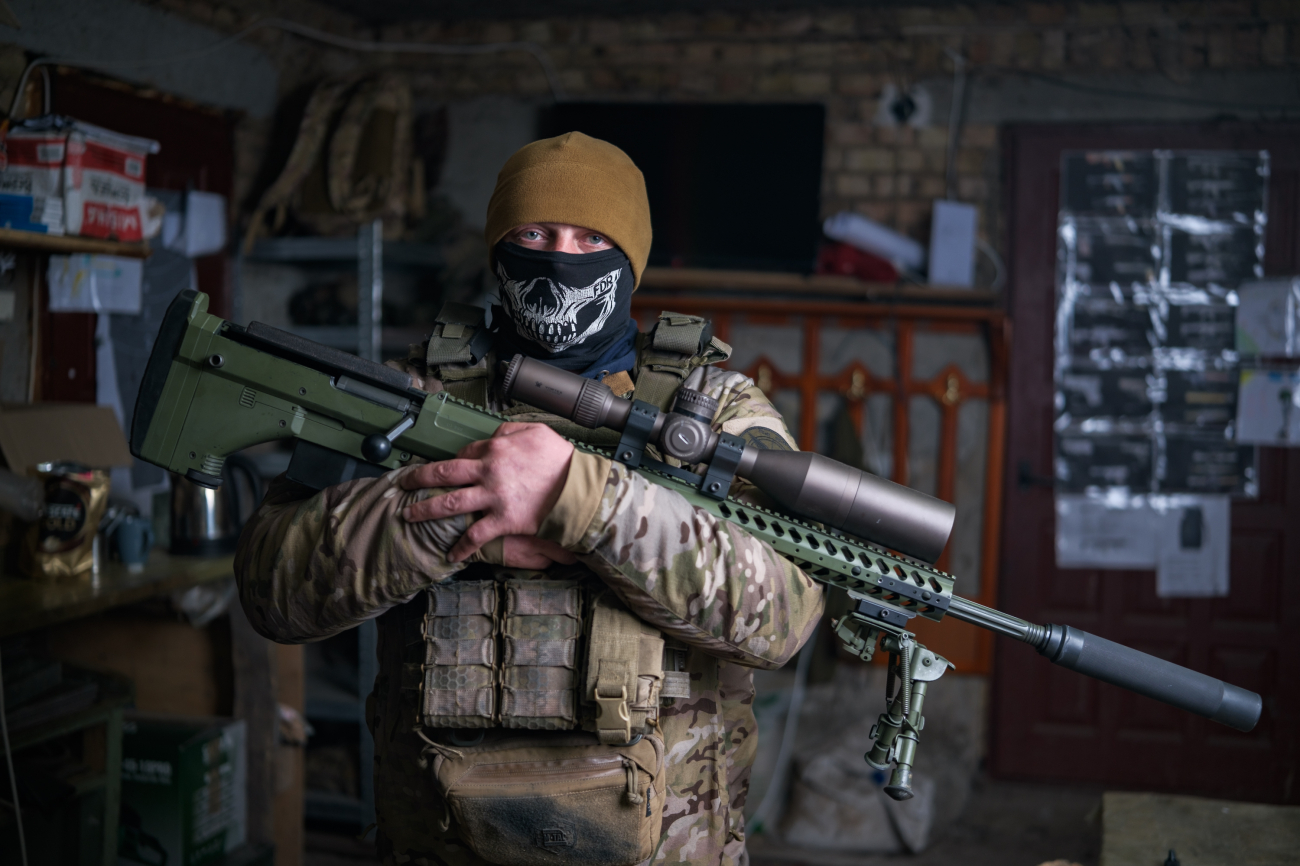
Photo: Sniper of the 1st category "Fizruk" has been serving in the Armed Forces for 10 years
A sniper sees more on the battlefield than others. This allows them to assess the situation more soberly. During an assault, they "cover" their comrades, selecting targets that could cause the most damage – machine gunners or anyone who could fire at our forces.
When the enemy identifies a sniper's position, all available heavy weaponry is immediately brought to bear on it. "Fizruk" demonstrates the consequences of such an attack on a sniper’s position by showing a rifle – the optical sight is completely destroyed, and the barrel is twisted.
That day, in the Siversk direction, the enemy attempted to storm our positions. "Fizruk" was working with a rifle, trying to suppress the enemy's fire. There were many machine gunners, and they realized who was firing at them. They brought in heavy weaponry. The mortar started firing very close, and the sniper decided to withdraw from the position. At that moment, Grad rockets and Solntsepyok – a heavy flame-throwing multiple rocket launcher system with a 220mm caliber – began to strike the area.
"We managed to hide but didn’t grab the rifle in time. We hid underground, and I didn’t dare go back out. If I had gone for it, I probably wouldn’t be speaking with you now. I tried to go out, and a mortar hit the wall. The shockwave threw me back. My colleague started to worry. He thought I was already dead. He hit me in the face and yelled, 'Are you alive, are you alive?' I opened my eyes. I was a little nauseous, and a bit hard of hearing. As they say, the people are fine, but the concrete didn’t make it," recalls "Fizruk."
Despite these "special features" of their work, the guys don’t particularly dwell on the fact that their lives could end in such moments.
"Life can end at any moment, even here. A car could hit me, or a Shahed drone could kill me. Of course, the probability is higher on the frontlines. But this is my profession, and I chose it consciously. When you’ve studied to become a surgeon and are asked to operate on someone, but you say you're afraid of blood – what kind of surgeon are you then? I joined the service back in 2008. Even before the war, I understood the risks. Now, all these risks are expected. Including the risk of dying," says "Udav."
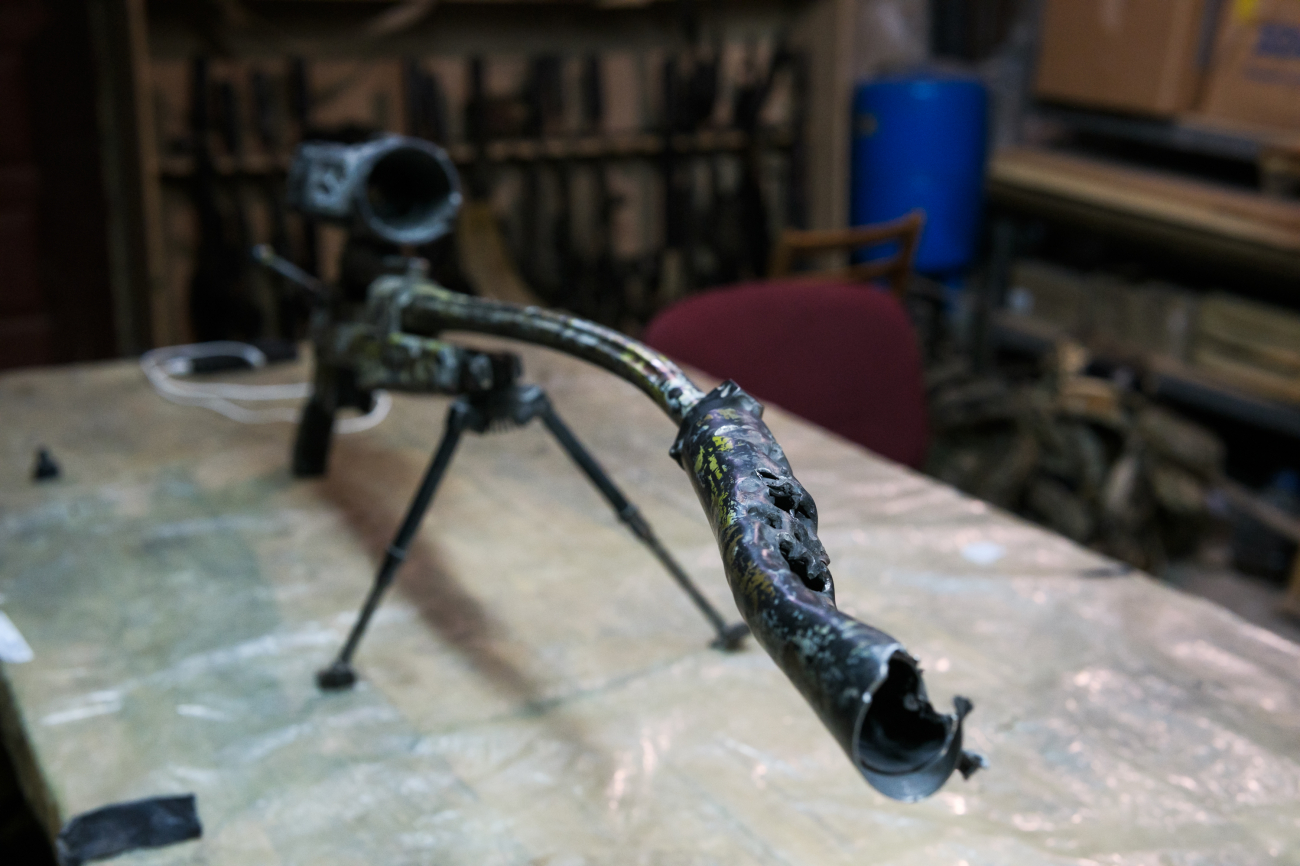
Photo: The consequences of enemy strikes on the position where the Ukrainian sniper was located
He has four children. He points out that the state gave him the right to defer service, and he could leave the military at any moment. However, his children are what keep him in the trenches, because they need protection.
"Fizruk" has been on the front lines almost throughout the war, since 2014. He joined when he was still under 20. He was in Mariupol and Shyrokyne.
"There were people who said, 'Are you an idiot? You're 19 years old. What war?' But someone had to defend the country. I've spent my entire professional life in the army. I made this decision consciously. I knew I would be in the Armed Forces of Ukraine. Years have passed, and now I have a son and a daughter. And now people tell me, 'Why don’t you have a third child? You could get discharged from the army.' But this is the job I chose for myself," he explains.
'Creative profession.' Who definitely won’t make it as a sniper
The effectiveness of a sniper's work depends on many factors: preparation, psychological readiness, and technical support.
"Patriotism is important. Because these tasks are definitely not about financial gains," notes "Udav."
A sniper needs analytical thinking. Knowing how to choose a position, methods of camouflage, and avoiding being unmasked after a shot.
It’s crucial to anticipate how and when the enemy might spot you, where dust might rise after you take a shot. You need to understand what could give you away. You must feel and understand natural phenomena. Because the choice of position and visibility is influenced by any weather: from fog to rain and wind. It's also essential that the body is resilient and tempered.
"This is definitely a creative profession. Because you have to constantly come up with new strategies to outplay and deceive the enemy. You must always stay one step ahead. Be able to shoot with all the types of weapons available in the unit. If you need to work with a machine gun, you work. If you need to pick up a rifle, you quickly switch. There's also the concept of a sniper pair. Depending on skills and tasks, the command decides who will go together on a mission," he explains the specifics of the job.
During the war, it doesn't matter how many courses one has taken or how many certificates one has, the guys say. Some serve for only a month and during this time gain as much experience as others did not have in 10 years because they were in a “rear” position.
When selecting for a sniper group, they also observe how a person behaves in everyday life. Whether they have moral endurance. According to "Fizruk", snipers won’t take in those who panic and get anxious easily.
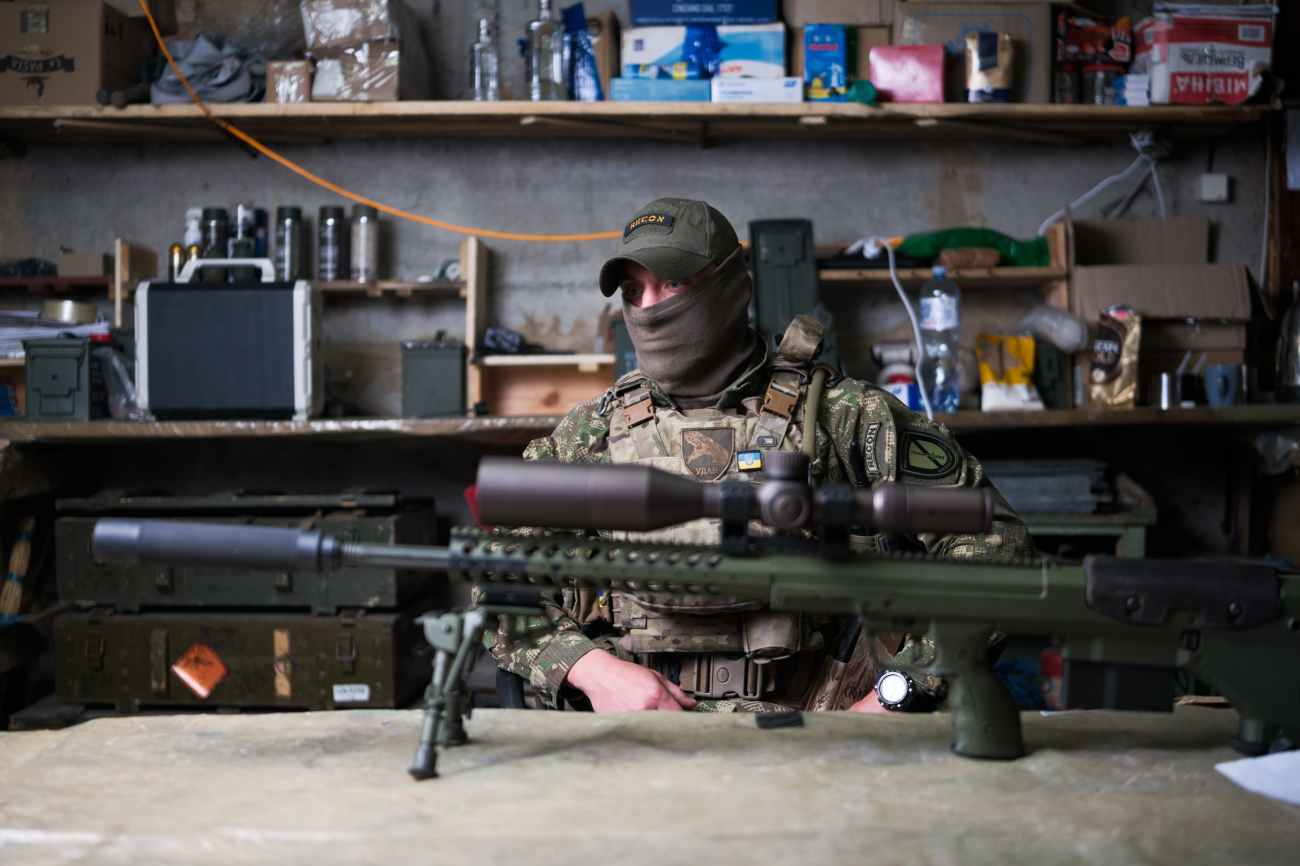
Photo: For the profession of a sniper, patriotism is important because it's definitely not about money, says the soldier.
"A person who is anxious won't suit us. And in general, someone who creates panic is needed by no one. Who needs someone running around and shouting, 'What should we do, we're all going to die?' at a critical moment?" the soldier smiles.
Both men agree that forcing someone into the army is a bad idea.
"There will definitely be no place for such people in our unit. And generally, pushing people into the army with a whip is wrong. What result will there be if a person lacks the main thing — the desire to be here? There will always be a shortage of people. But forcing those who don't want to be here to the front line is like giving a university-level problem to a 12-year-old child," says "Udav."
An image from the movies. Myths surrounding the profession
A sniper typically stays in position for no more than three days. But with every sortie, they multiply the days in their heads by two or three. When told they need to stay for three days, they plan for 5-6.
A sniper stays longer in position if the situation on the front escalates, with the risk of enemy breakthroughs or assaults. If, on the third day, there is information that an assault is planned for the next day, everyone understands that no one is going anywhere.
It's often said that a sniper must be serious and focused. But "Udav" notes that the same applies to machine gunners, drone operators, and infantry.
A lot of romanticism is attached to the sniper profession. Some people draw images of them from films and TV shows. But in war, there is no romance, he assures. It’s all dirt.
"It’s strange to hear someone say, 'I like this.' I would like my profession if, in peacetime, I could train myself, train my comrades, and perfect my skills. But now is a time when we need to hold back the enemy," explains the soldier.
The biggest myth that "Fizruk" has heard about snipers is when people say, "You’re snipers, you must always wear diapers."
"There are bags and bottles for that. In reality, it’s not like you have to lie down and never get up for a whole day. Minimizing movement, yes, that’s necessary. It depends on where you are, and what the situation is around you. But if the position is indoors, it’s not necessary to lie in one position all the time," he says.
Group of snipers held off an enemy assault for four days
The soldiers don’t keep track of how many Russian soldiers they eliminated during their work. They say that the source of professional pride more often comes from hitting a target from a distant position. For example, when they manage to make a precise shot from over two kilometers away. This demonstrates the sniper’s skill. As for eliminating enemies, there were days when they managed to kill about 20 men.
"Do I feel anything when I kill an enemy? No. No special emotions. We just understand that we are doing our job. There are far more emotions when you're shooting at a target on a range. That's where the competitive element is. But here – it’s service and duty. The task is to reduce the number of enemies on our land as much as possible," says "Udav."
At the beginning of the large-scale war, during one of his missions, he worked in Popasna alongside other snipers. He and three other guys held off the enemy’s advances for more than three days. Every day, a whole Russian army platoon – 100 to 120 soldiers – came toward them.
"From morning till night, the four of us eliminated up to 30 Russians. We were able to hold out for so long because our position was undetected. We were in the Ukrtelecom building. Our comrades from another brigade were in the city. Our efforts to stop the enemy allowed them to take more advantageous positions. Four snipers with an AGS (Soviet 30mm automatic grenade launchers – ed.) held off the assault, giving our fighters a chance to reposition," recalls the defender.
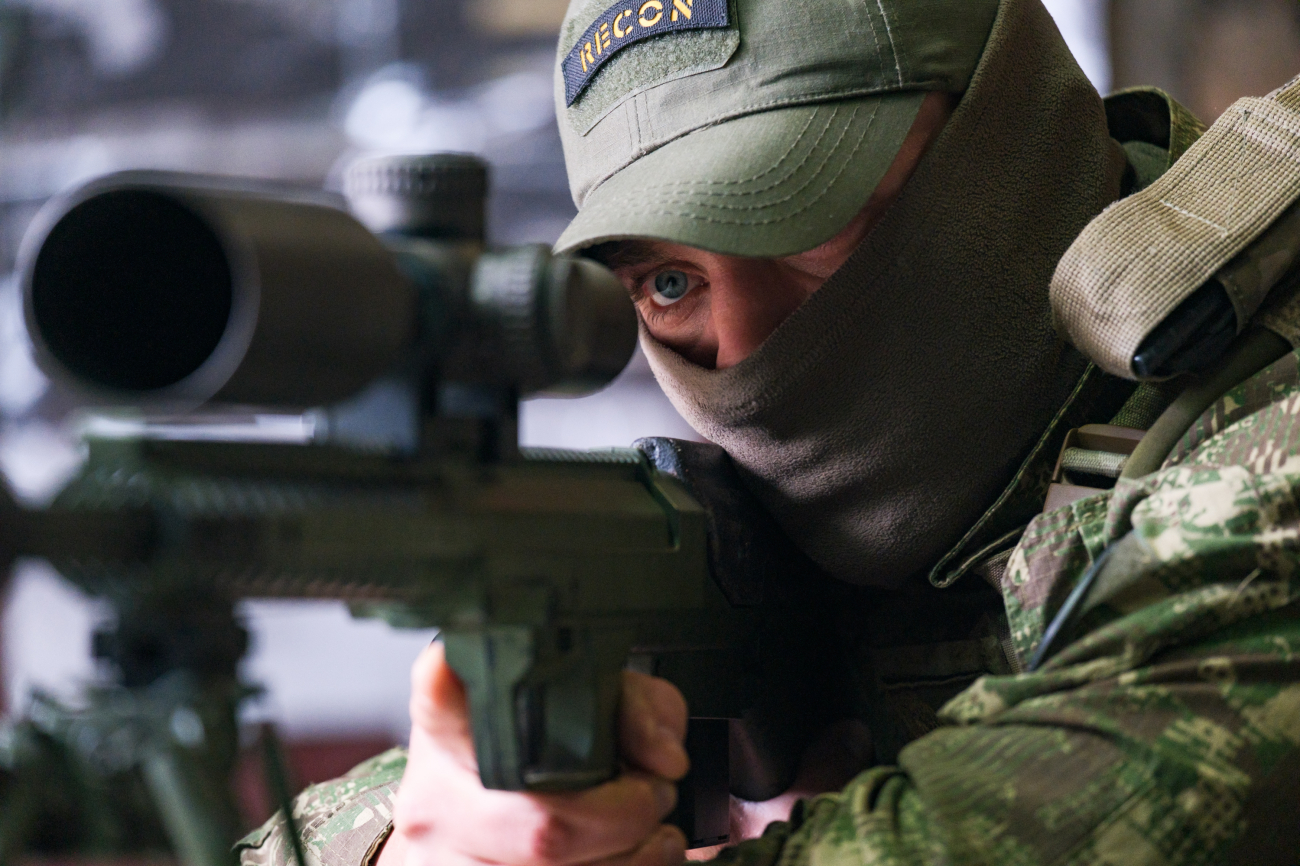
Photo: The four defenders were able to hold off the assault of a large number of Russian troops in Popasna
Based on intercepts and later the battalion commander's report, "Udav" remembers that the Russian soldiers started to panic. Over the radio, they could hear: "We’re being targeted by snipers! Everyone get into protective gear! Don't expose yourselves unless absolutely necessary!"
Eventually, the Russian troops grew tired of being "tormented" by a pair of snipers. A tank arrived and destroyed their position, forcing the guys to relocate. The soldier recalls: it was indeed a big risk.
"But that was exactly the kind of situation where the game was worth the candle. There were two wounded, but none of our guys were killed," he says.
The enemy breached the defense at two points. When the snipers were leaving, they were informed over the radio that the Russian troops were already just 150-200 meters away from them. Meanwhile, they quietly moved through the yards. They took along a couple of soldiers from another brigade who had lost contact with their command. They walked through most of Popasna on foot. They saved themselves and led their comrades out.
Often on the front line, understanding who is a friend and who is an enemy can lead to unexpected situations. When "Fizruk" was in Klishchiivka, intelligence reported that the Akmat unit was preparing to amass forces for an assault.
"They were supposed to storm us in the morning. At night, my colleague and I decided to go and scout the situation. By pure chance, we ended up on the enemy’s position and, using the Barrett, eliminated 5 subgroups of 5-10 men (Barrett M82 and other models – large-caliber sniper rifles made in the USA – ed.)," says the soldier.
According to him, on the front line, you shouldn’t be afraid to set ambitious goals for yourself. But you also need to consider all the factors.
"Once, we wanted to shoot down a Russian Army helicopter with the Barrett. We really wanted to, we were ready to shoot. But then morning came, and the conditions weren’t the same. Such weapons are designed for stationary targets. For example, to pierce a corner of a building. But technically, it’s possible to bring down a helicopter with a large-caliber rifle. You won’t know until you try," the soldier smiles.
How much does sniper weaponry cost and what are the salaries?
Some of the snipers' firearms are kept in the basement at the permanent deployment point. There are a few Kalashnikovs, but most of them are Western-made. For example, the AR-15 (ArmaLite AR-15) is a semi-automatic rifle made in the United States.
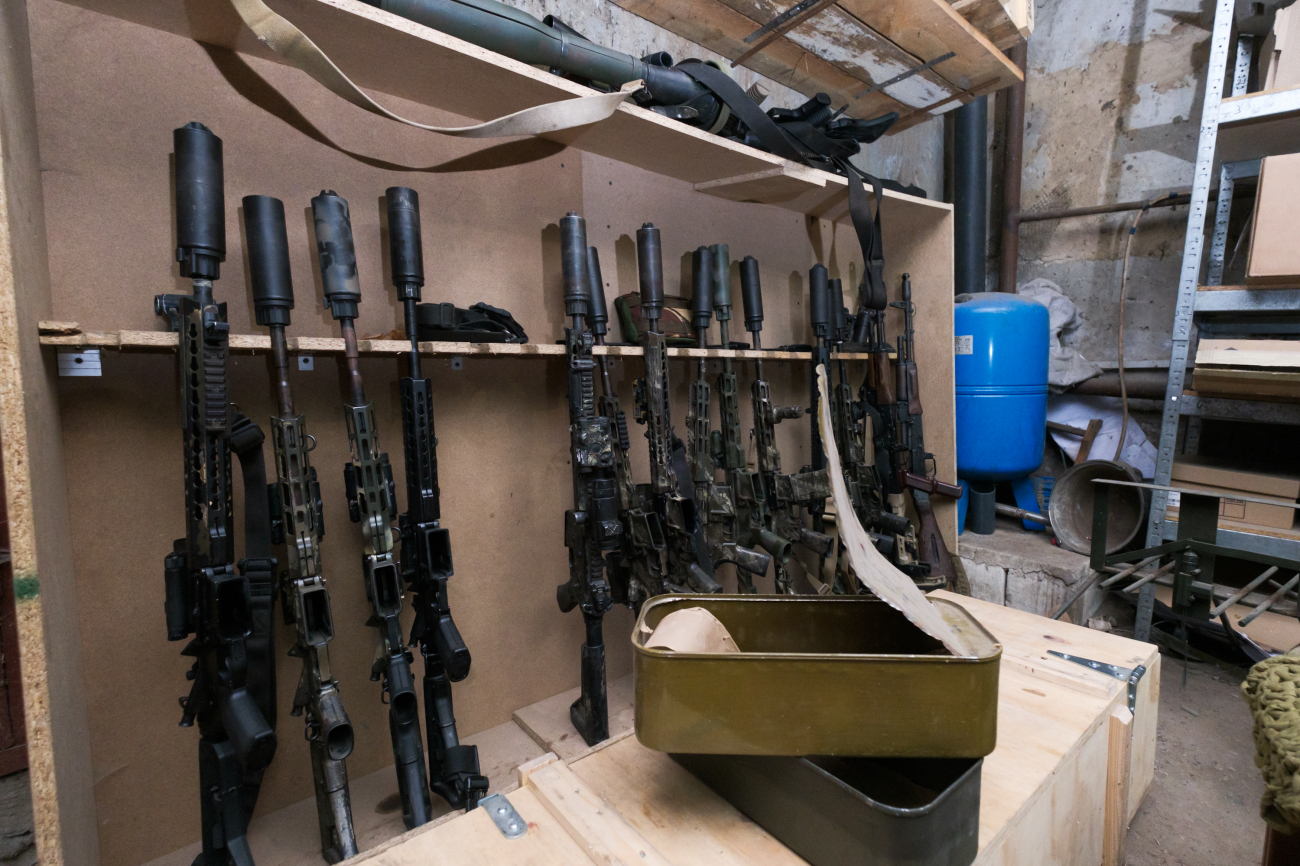
Photo: Some of the sniper weapons from the reconnaissance platoon's arsenal
"Here, you see, with collimator sights, laser target designators (LTDs, an important part of firearms). There's also an RPG on top, hand-held anti-tank grenade launchers," the sniper describes the weapons in the room.
All of this is provided by the state. Sometimes, if they can afford it, they buy things for themselves.
"If we want to buy something for ourselves, the state doesn't object. It's possible to register it as a personal weapon and get an official permit. All of that is doable. Although, at the moment, we're fully equipped with individual firearms. There's no urgent need to buy anything ourselves," the soldier explains.
The prices for such weapons depend on many factors. A standard rifle without sights or LTDs costs about 150,00 UAH. Often, optics cost more than the rifle itself, around 250,000. Professional ones are much more expensive. One of them has a sight that costs about 500,000 UAH, and the weapon itself costs the same. There are discounts, but in general, a professional rifle with optics will cost around one million UAH.
However, the sniper's salary, when he's not deployed on missions, is about 30,000 UAH.
"I'm not hiding it, and the guys know my salary. But just the rent for an apartment costs 12,000. Then there's my wife, kids. Honestly, it's a struggle for everyone right now. What are the prices in stores now? You can easily spend 1,000 UAH and get nothing. The boots I'm wearing right now cost 10,000 hryvnias — that’s a third of my salary. Others wouldn't survive in these conditions," continues "Udav."
In civilian life, "Udav" admits he loves to read.
“Books are my weakness. I want to write a book myself, to describe my own and my comrades' combat experience. Sometimes I think it would be good if someone recorded the experience of the fighters. It is important for history. I also love music and sports. I play the guitar and the trumpet. My wife gave me a flute, but I still haven't mastered it. I dream of finally having the time to do so,” he says.
"Fizruk" loves football. He hopes his children will be interested in it as well. He hopes that when his son grows up, he’ll engage in some form of martial arts. Above all, he values time with his family.
'Thanks to the iron will and character of Ukrainians, there is no tricolor in Kyiv today'
Belief in enemy propaganda is always a personal choice and responsibility, says "Udav."
"Imagine I'm a Russian soldier, and my commander orders me to go to Poland. I would think: 'Why Poland?' If I hear it's a 'military operation,' I still have the choice of whether to obey. No commander or president can force me to shoot civilians; no one can make me commit atrocities," he explains.
The crimes of the Russian forces in Ukraine are also their conscious choice, the soldier adds. A commander can give an order, but he doesn't control every step of the soldier. Killing, and torturing — this is their way of life. If the commander ordered to shoot civilians, his subordinate would certainly never carry it out.
"Fizruk" agrees: he would never shoot a person without a weapon and can't even imagine doing so. "For me, it means losing humanity," says the sniper.
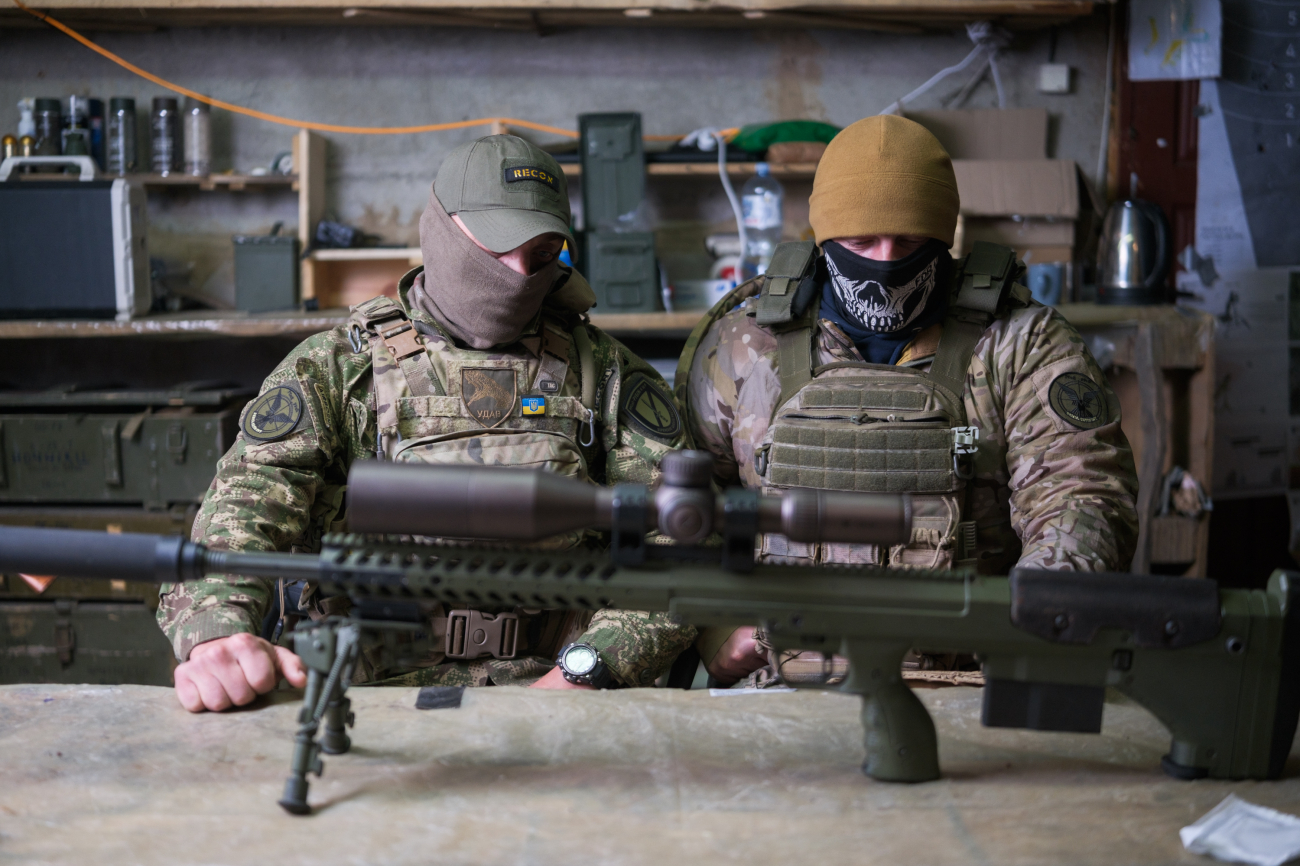
Photo: A rifle, where the scope alone costs 500,000 UAH
Recently, the guys have noticed that instead of saying "victory," they often say "just peace." They both agree: no matter how the war ends, a just peace will still not happen.
"What is justice — in people, money, territories? If we get some territories back, will we consider peace just? A just peace would be if the war never happened. Let a million Russians die and ten of ours. It would still be unfair," says "Udav."
When the conversation turns to the borders of 1991, the guys smile sadly. "Udav" says that instead of thinking about borders, he often thinks about his wife and children being able to leave the house peacefully, without risking being hit by a missile strike. And about people finally stopping to die.
The soldier adds: in the first months of the war, people united for a common cause, but now he thinks twice before leaving a pickup truck painted green somewhere in the city. He's heard stories about military vehicles being set on fire. He's also disappointed that many still think the war only affects them in the form of occasional power outages at home.
"But there is something in Ukrainians that has allowed us to effectively hold back the enemy for so long. It's our spirit and the fact that we are still good at fighting. No matter how many shells the enemy has, we have character, and we have something to fight for. That's the main reason we're able to talk to you now. And that's probably the main reason why the tricolor isn't hanging in Kyiv right now. It's thanks to our character and our strong, iron will," emphasizes the defender.



